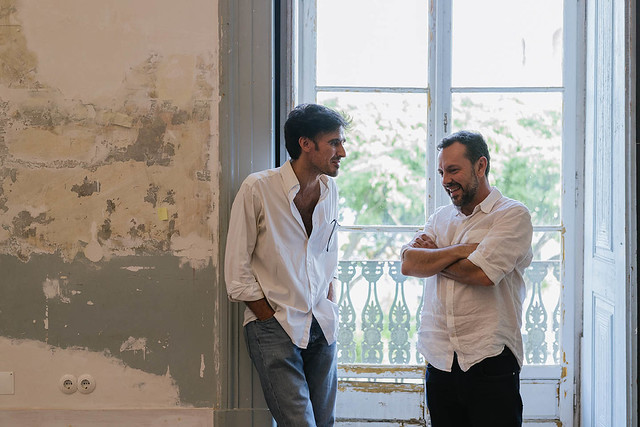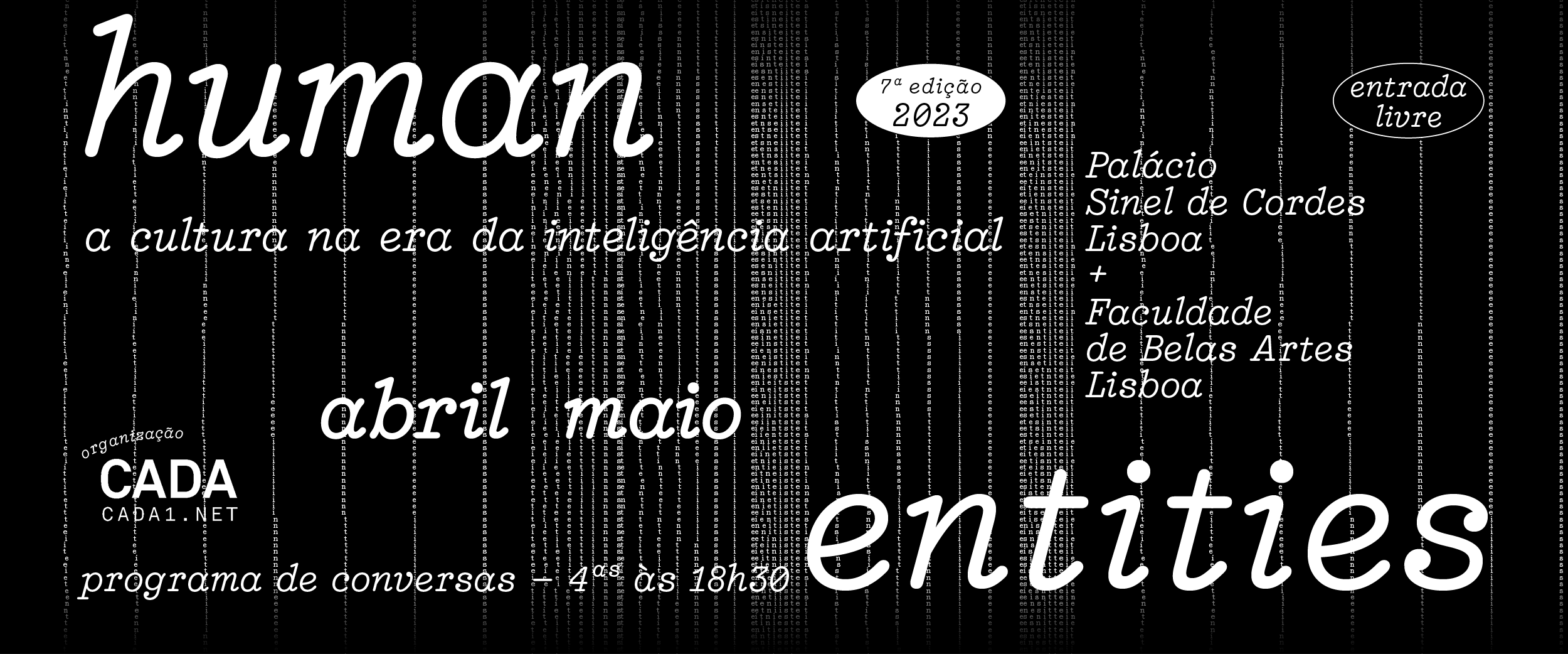
Human Entities 2023: a cultura na era da inteligência artificial
7ª edição
Programa de conversas, abril – maio 2023
Organização CADA em parceria com a Trienal de Arquitectura de Lisboa
Entrada livre, mediante registo
As conversas são em língua inglesa
Podcast
Ouça as gravações de 2023
Listen to recordings from 2023.
[English below]
Sinopse
De repente, o futuro chegou. Depois de décadas a navegar online à deriva no mainstream de ontem e de muita conversa sobre a desaceleração cultural, o ChatGPT desencadeou um momento de rara excitação. Vivemos um ponto de viragem. A Inteligência Artificial (AI) generativa oferece-nos um vislumbre do que pode ser uma nova interface universal – e transporta-nos diretamente para o âmago do século XXI. Este avanço no machine learning aconteceu ainda mais rápido do que o esperado até pelos tecno-otimistas. E embora, como afirma Joanna Bryson, a tecnologia básica por detrás deste modelo de conversação seja essencialmente um motor de busca, o hype da indústria e a forma como capta a imaginação das pessoas, são respostas compreensíveis. E, assim como com os media sintéticos em geral, embora seja difícil prever o que a atual explosão pode significar para a evolução humana, é fácil perceber que esta é potencialmente uma mudança maior do que o advento dos meios digitais. E talvez, eventualmente, mais arte e media começará a inclinar-se para o futuro.
Esta 7ª edição do Human Entities começa com uma conversa com Mark Leckey. É sua crença de longa data que quanto mais a tecnologia avança, mais as nossas mentes são lançadas de volta ao passado, à magia, à estética medieval e às buscas anteriores por um maior sentido de espiritualidade.
Além disso, à medida que a tecnologia e as alterações climáticas exigem que repensemos a nossa relação com o mundo, um número crescente de pessoas estão a exigir novas formas de tomada de decisão democrática. Manuel Arriaga e Pedro Magalhães irão debater conjuntamente como podemos diversificar e expandir a participação política.
De seguida, nesta presente era de crises perpétuas, Orit Halpern questiona a assunção de que as tecnologias computacionais irão resolver todos os problemas da humanidade, ajudando-nos a combater tudo, do colapso climático à volatilidade económica, apresentando ainda abordagens inovadoras para a conceção de futuros planetários alternativos.
Na última conversa, Joanna Bryson irá discutir o que distingue os humanos da IA. A sua palestra examina se é ou não errado assumir que a competência do ChatGPT implica compreensão, e também os motivos para a necessidade de imbuir a IA com valores humanos.
Jared Hawkey/Sofia Oliveira (CADA)
Programa
Quarta, 19 de abril 2023, 18.30
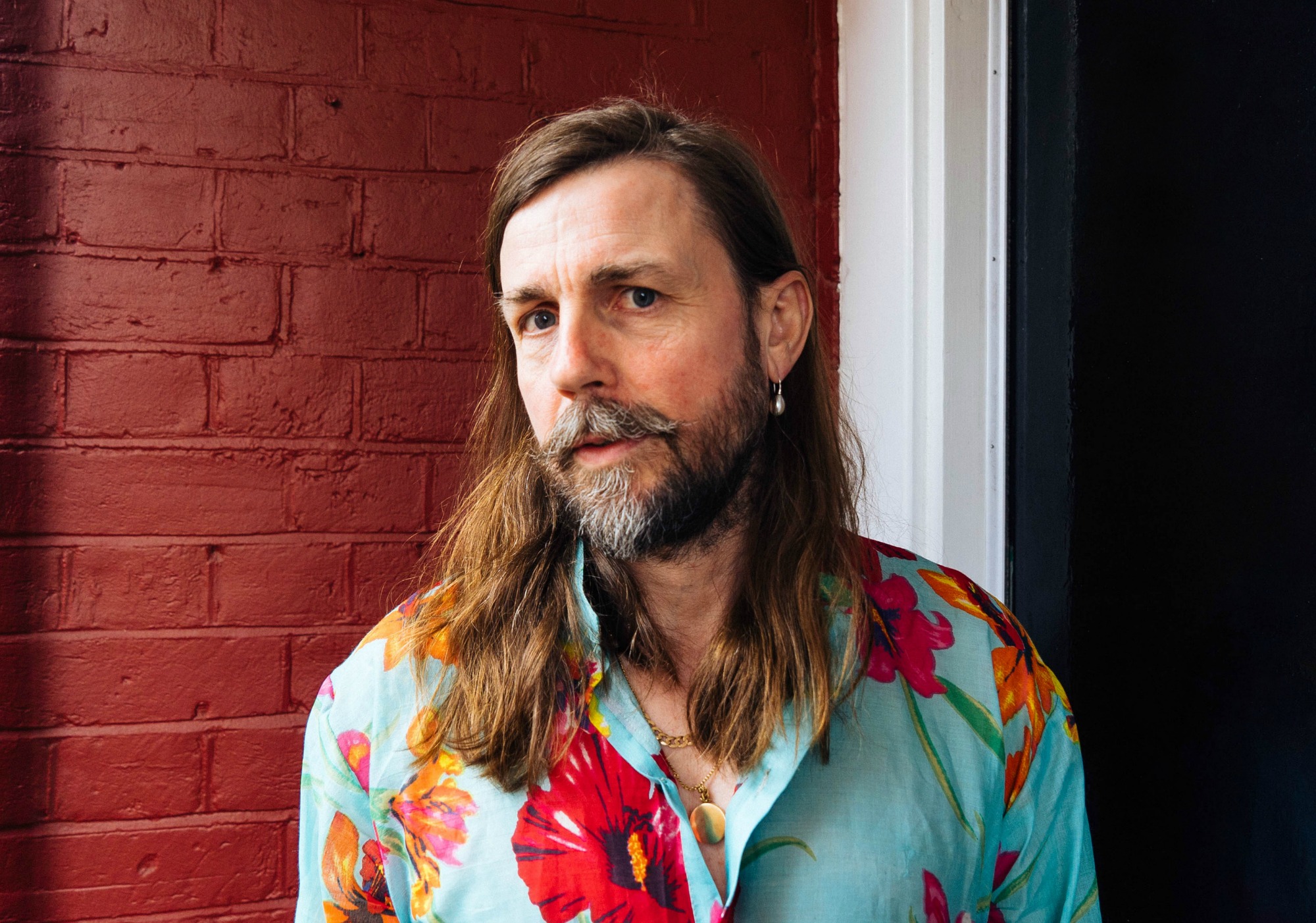
Artist talk
Mark Leckey
Artista
Mark Leckey é um dos artistas contemporâneos mais influentes. Desde o fim dos anos 90, o seu trabalho tem-se debruçado sobre a relação entre cultura popular e tecnologia e explorando os temas da juventude, classe e nostalgia. Leckey trabalha com escultura, filme, som e performance – às vezes em simultâneo. Os seus trabalhos mais conhecidos são Fiorucci Made Me Hardcore (1999) e Industrial Light and Magic (2008), com o qual ganhou o Prémio Turner.
O seu trabalho já foi exposto em muitos países. Teve uma exposição individual na Tate Britain, em 2019, na Serpentine Gallery, em 2011, na Kölnischer Kunstverein, Colónia, em 2008 e no Le Consortium, Dijon, em 2007. As suas performances foram apresentadas em Nova Iorque no Museum of Modern Art, Abrons Arts Center e no Institute of Contemporary Arts, em Londres, em 2009, e no Museu Guggenheim de Nova Iorque, em 2008. As suas obras integram as colecções da Tate e do Centre Pompidou.
https://markleckey.com
https://www.cabinet.uk.com/mark-leckey
https://www.tate.org.uk/art/artists/mark-leckey-6877/introducing-mark-leckey
https://www.youtube.com/@MrLeckey
https://www.instagram.com/mark.leckey
https://twitter.com/MarkLeckey
https://www.nts.live/shows/mark-leckey
Podcast
Quarta, 26 de abril 2023, 18.30
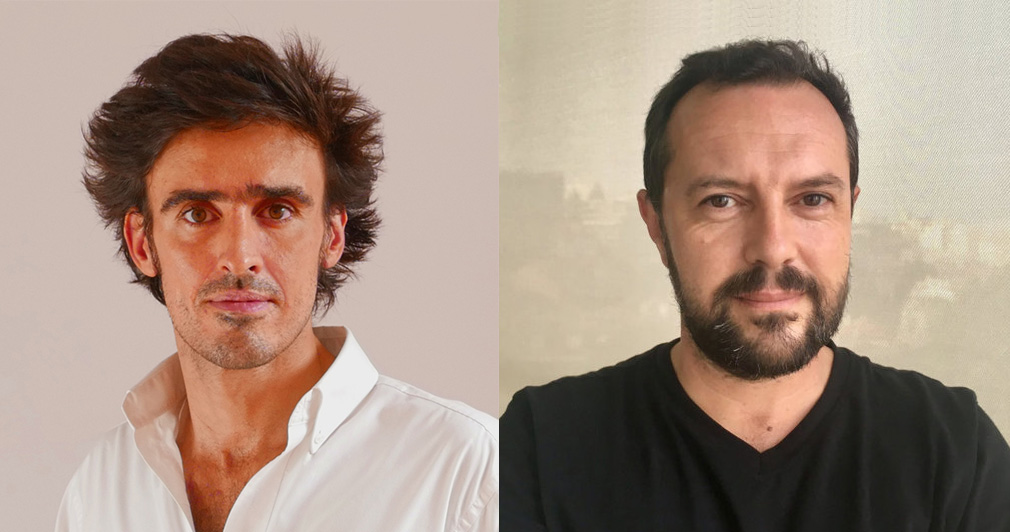
Rebooting democracy
Manuel Arriaga + Pedro Magalhães
Manuel Arriaga é professor universitário e um dos fundadores do Fórum dos Cidadãos.
Pedro Magalhães é investigador do Instituto de Ciências Sociais, Universidade de Lisboa
A democracia é uma tecnologia de decisão coletiva que agrega vontades e define um curso de ação. No entanto, segundo o diagnóstico de muitos, trata-se de uma tecnologia “em crise”. Uma parte importante da experiência contemporânea de “frustração democrática” parece resultar do contraste entre a estagnação das formas de fazer política e a rápida evolução da tecnologia digital. Enquanto consumidores, aprendemos, há muito, a esperar – e a exigir – inovação. No entanto, enquanto cidadãos, confrontamo-nos regularmente com a imutabilidade dos mecanismos de governação.
Em democracia representativa, quem é efetivamente representado? Como, e até que ponto, os interesses e preferências das pessoas – e de diferentes pessoas – se convertem em políticas? No que diz respeito ao tema do ambiente e das alterações climáticas, a cada ciclo eleitoral parece haver uma espécie de miopia, ou de horizonte curto, que resulta exclusivamente na articulação e resolução de (alguns) problemas de curto prazo.
Em que medida formas de “inovação democrática”, especialmente as que servem para criar maiores oportunidades de participação política, podem servir para lidar com os problemas de longo prazo, nomeadamente com a crise climática? Qual o potencial de outras formas de organização política em complemento, ou mesmo alternativa, à democracia representativa?
A conversa será moderada por Catherine Moury, Professora Associada de Ciência Política e Diretora do Programa de Doutoramento do Departamento de Estudos Políticos da Universidade NOVA de Lisboa.
Manuel Arriaga
Manuel Arriaga é professor universitário, autor de Reinventar a Democracia – 5 Ideias para um Futuro Diferente, um dos fundadores do Fórum dos Cidadãos e, mais recentemente, um dos impulsionadores do (ainda inexistente) partido FUTURO.
https://www.rebootdemocracy.org
https://www.forumdoscidadaos.pt
https://www.futurodemocratico.pt
Pedro Magalhães
Pedro Magalhães é investigador do Instituto de Ciências Sociais da Universidade de Lisboa, onde desenvolve investigação na área da opinião pública e atitudes políticas, em particular as atitudes relativas à democracia.
https://www.pedro-magalhaes.org
https://twitter.com/PCMagalhaes
Podcast
Quarta, 3 de maio 2023, 18.30
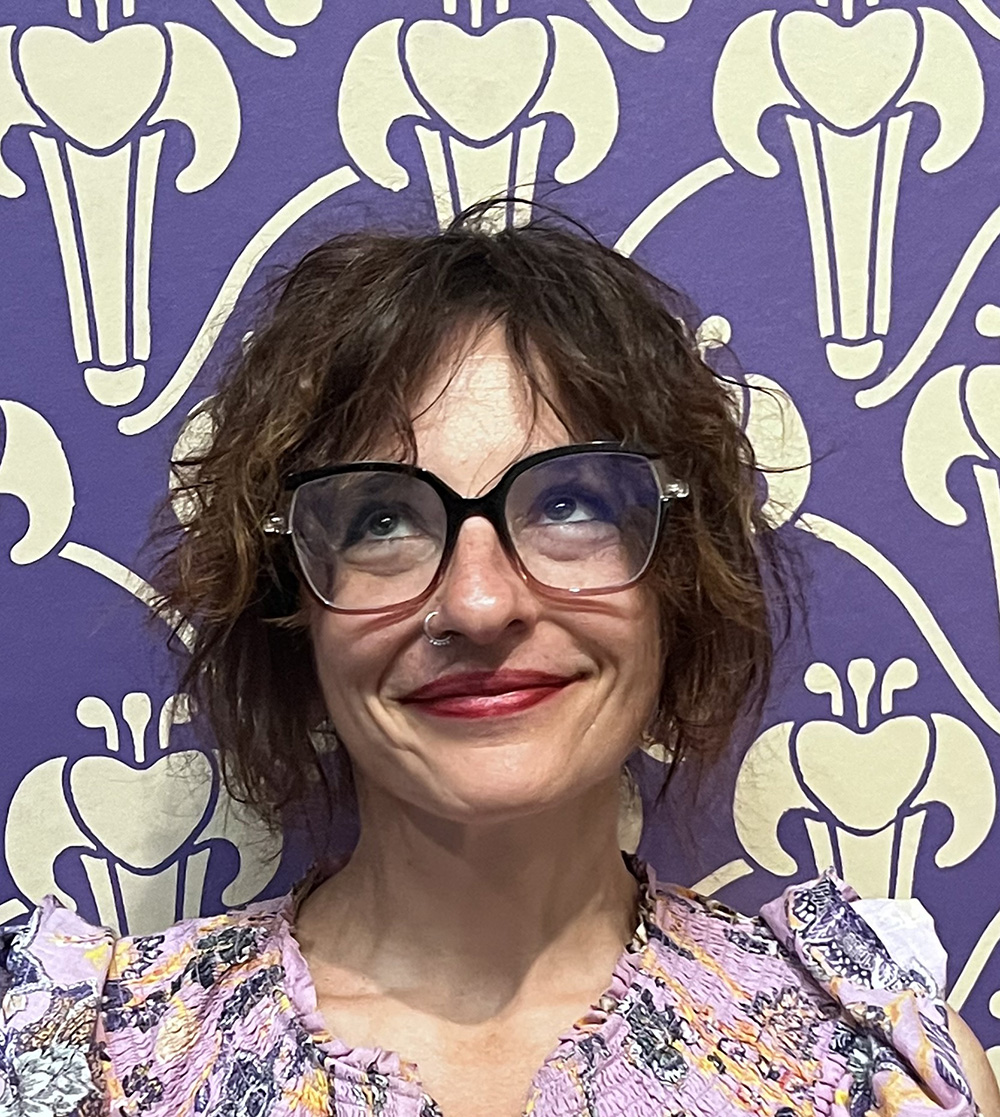
Smart Power
Orit Halpern
Professora Universitária, Cátedra de Culturas Digitais e Mudança Societal na Technische Universität Dresden
As preocupações crescentes com as alterações climáticas, a escassez energética, a segurança e a instabilidade económica voltaram ao foco dos urbanistas, investidores, cientistas e governos, que entendem as tecnologias computacionais como potenciais tábuas de salvação para um mundo habitualmente definido por catástrofes e “crises”. De simulações computacionais meteorológicas em grande escala, a cidades e infraestruturas inteligentes, a projetos de geo-engenharia, a criptomoedas e blockchains temos, sem dúvida, transformado o planeta num tubo de ensaio e numa experiência para as tecnologias computacionais. A propagação das tecnologias digitais por quase todas as partes da vida transformou a forma como compreendemos a natureza, a cultura e o tempo. Mas que futuros estamos a imaginar, ou a excluir, através destas “experiências” planetárias? Como é que passámos a ver a sobrevivência humana como fundamentalmente dependente das redes computacionais? Esta conversa mapeia a ascensão deste “mandato de inteligência”. Traçando genealogias a partir da inteligência artificial, finanças, arquitectura e arte, descreverei o modo como a computação ubíqua se tornou uma das lógicas dominantes do nosso presente (e, possivelmente, do nosso futuro) e com que consequências.
Orit Halpern
Orit Halpern é Professora Universitária na Technische Universität Dresden, onde dirige a Cátedra de Culturas Digitais e Mudança Societal. O seu trabalho articula as histórias da ciência, computação e cibernética com o design. Doutorada pela Universidade de Harvard, foi investigadora visitante no Max Planck Institute for the History of Science, em Berlim, na IKKM Weimar e na Duke University. Atualmente, está a trabalhar em dois projetos: o primeiro é uma história da inteligência e da evolução; o segundo examina infra-estruturas extremas e a história da experimentação a escalas planetárias em design, ciência e engenharia. Publica regularmente em revistas como a Critical Inquiry, Grey Room, Journal of Visual Culture e E-Flux. O seu primeiro livro, Beautiful Data: A History of Vision and Reason (Duke UP 2015) investiga histórias de big data, design e governabilidade. O seu mais recente livro, com Robert Mitchell, The Smartness Mandate (MIT Press, 2023), é uma teoria e história do conceito de “inteligência”, que interroga a relação entre computação, população, economia e governabilidade.
https://orithalpern.net
https://governingthrough.design
https://againstcatastrophe.net
Podcast
Quarta, 17 de maio 2023, 18.30
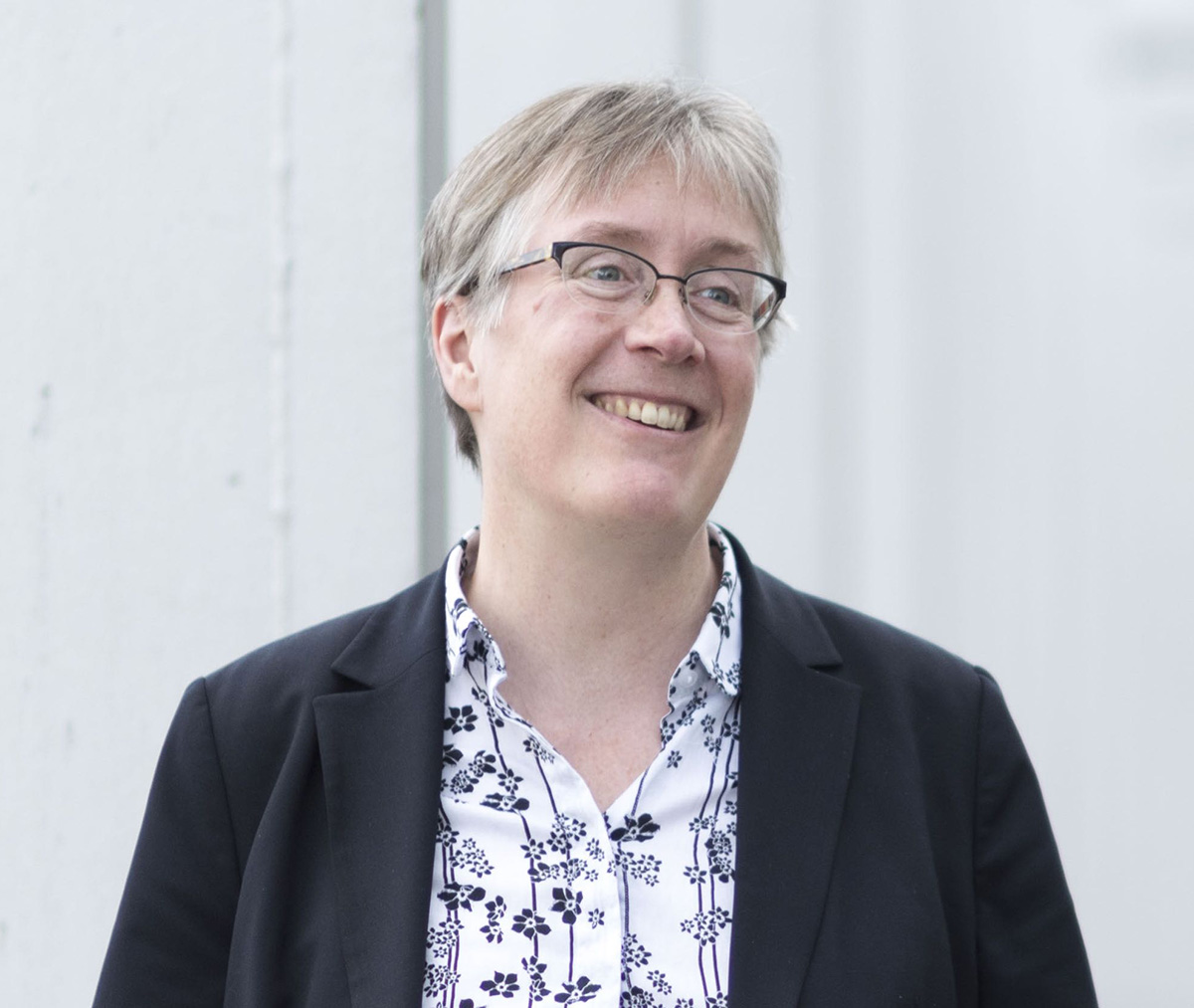
Autoria, Agência e Obrigação Moral
Joanna Bryson
Professora de Ética e Tecnologia na Hertie School of Governance, Berlim
Quanta da nossa experiência humana individual pode ser absorvida por modelos computacionais quando usamos machine learning e uma enorme quantidade de dados? Irá a Inteligência Artificial (IA) tornar-se senciente? Soberana? Ambiciosa? Como é que conviver com IA irá mudar a nossa experiência diária? Nesta conversa, Joanna Bryson refletirá sobre as ciências naturais, sociais e computacionais, descrevendo a inteligência humana e a artificial, abordando temas como governação, justiça e criatividade. Aquilo que fazemos importa – e temos o dever, perante nós mesmos e o nosso planeta, de criar e manter uma boa governação de todos os artefactos da nossa espécie.
Joanna Bryson
Joanna J. Bryson, Professora de Ética e Tecnologia na Hertie School, é uma académica reconhecida pela sua ampla experiência no estudo da inteligência, da sua natureza e consequências. Bryson aconselha governos, agências transnacionais e ONG de todo o mundo, particularmente em políticas de IA. É licenciada em Psicologia e em Inteligência Artificial (BA Chicago, MSc & MPhil Edinburgh, PhD MIT). O seu trabalho tem sido publicado em locais que vão desde o reddit à revista Science. Continua a desenvolver trabalho de investigação tanto em engenharia de sistemas de IA como em ciência cognitiva da inteligência, com especial enfoque no impacto da tecnologia na cooperação humana e em novos modelos de governação para a IA e as TIC.
https://www.joannajbryson.org
https://joanna-bryson.blogspot.com
https://twitter.com/j2bryson
Podcast
ENGLISH
Human Entities 2023: culture in the age of artificial intelligence
Seventh edition
Programme of public talks, April – May 2023
Organised by CADA in partnership with the Lisbon Architecture Triennale
All welcome, free entry, booking required
Talks in English
Synopsis
Suddenly the future has arrived. After decades of wallowing online in yesteryear’s mainstream and much talk of cultural deceleration, ChatGPT has sparked a moment of rare excitement. We’re living in a flashpoint. Generative AI gives us a glimpse of what is a new universal interface − and it has landed us squarely in the 21st century. This leap in machine intelligence came faster than even techno-optimists expected. And while, as Joanna Bryson points out, the basic technology of this conversational model is essentially a search engine, the industry hype and the way it’s capturing people’s imagination are both legitimate responses. As with synthetic media more generally, although it’s hard to predict what the current explosion might mean for human evolution, it is easy to see this is potentially a bigger shift than the advent of digital media. And maybe, eventually, more art and media will start to lean towards the future.
The seventh edition of Human Entitles, starts with a talk by the artist Mark Leckey. It is his long-held belief that the further technology advances the more our minds are cast back to the past, to magic, mediaeval aesthetics and earlier quests for a higher sense of spirituality.
Moreover, as technology and climate change demand that we rethink our relationship to the world, growing numbers are demanding new forms of democratic decision-making. Manuel Arriaga and Pedro Magalhães will jointly debate how we can both diversify and expand political participation.
Next, in the current age of perpetual crises, Orit Halpern questions the supposition that computational technologies will solve all humanity’s problems, helping us fight everything from climate breakdown to economic volatility. She also presents novel approaches to the design of alternative planetary futures.
In the final event Joanna Bryson will discuss what distinguishes humans from AI. Her talk will examine whether or not it is erroneous to assume ChatGPT’s competency implies comprehension, and she will also consider the need to imbue AI with human values.
Jared Hawkey/Sofia Oliveira (CADA)
Programme
Wed 19 April 2023, 18.30
Artist talk
Mark Leckey
Artist
Mark Leckey is one of the most influential artists working today. Since the late 1990s, his work has looked at the relationship between popular culture and technology as well as exploring the subjects of youth, class and nostalgia. He works with sculpture, film, sound and performance – and sometimes all four at once. In particular, he is known for Fiorucci Made Me Hardcore (1999) and Industrial Light and Magic (2008), for which he won the Turner Prize.
His work has been widely exhibited internationally, including solo exhibitions at Tate Britain, in 2019, Serpentine Gallery, in 2011, Kölnischer Kunstverein, Cologne, in 2008 and at Le Consortium, Dijon, in 2007. His performances have been presented in New York City at the Museum of Modern Art, Abrons Arts Center; at the Institute of Contemporary Arts, London, both in 2009; and at the Solomon R. Guggenheim Museum, New York City, in 2008. His works are held in the collections of the Tate and the Centre Pompidou.
https://markleckey.com
https://www.cabinet.uk.com/mark-leckey
https://www.tate.org.uk/art/artists/mark-leckey-6877/introducing-mark-leckey
https://www.youtube.com/@MrLeckey
https://www.instagram.com/mark.leckey
https://twitter.com/MarkLeckey
https://www.nts.live/shows/mark-leckey
Wed 26 April 2023, 18.30
Rebooting democracy
Manuel Arriaga + Pedro Magalhães
Manuel Arriaga is a university professor and one of the founders of the Fórum dos Cidadãos; Pedro Magalhães is a researcher at the Institute of Social Sciences, University of Lisbon
Democracy is a technology of collective decision-making that aggregates intentions and defines a course of action. However, according to the diagnosis of many, it’s a technology ‘in crisis’. An important part of the contemporary experience of ‘democratic frustration’ seems to result from the contrast between the stagnation of ways of doing politics and the rapid evolution of digital technology. As consumers, we have long learned to expect – and demand – innovation. Yet, as citizens, we regularly confront ourselves with the immutability of mechanisms of governance.
In representative democracy, who is effectively represented? How, and to what extent, are the interests and preferences of people – and different people – converted into policies? With regard to the issue of the environment and climate change, in every election cycle there seems to be a kind of myopia, or short-sightedness, which exclusively focuses on the articulation and resolution of (some) short-term problems.
To what extent can forms of ‘democratic innovation’, especially those that serve to create greater opportunities for political participation, serve to address long-term problems, in particular the climate crisis? What is the potential of other forms of political organisation as a complement, or even alternative, to representative democracy?
This discussion will be moderated by Catherine Moury, Associate Professor of Political Science and Director of the PhD programme, Political Studies Department, NOVA University of Lisbon.
Manuel Arriaga
Manuel Arriaga is a university professor, author of Rebooting Democracy: A Citizen’s Guide to Reinventing Politics one of the founders of the Fórum dos Cidadãos and, more recently, one of the driving forces behind the political party (still non-existent) FUTURO.
https://www.rebootdemocracy.org
https://www.forumdoscidadaos.pt
https://www.futurodemocratico.pt
Pedro Magalhães
Pedro Magalhães is a researcher at the Institute of Social Sciences of the University of Lisbon, where he develops research in the area of public opinion and political attitudes, in particular attitudes towards democracy.
https://www.pedro-magalhaes.org/
https://twitter.com/PCMagalhaes
Wed 3 May 2023, 18.30
Smart Power
Orit Halpern
Full Professor and Chair of Digital Cultures and Societal Change at Technische Universität Dresden
Today, growing concerns with climate change, energy scarcity, security, and economic volatility have turned the focus of urban planners, investors, scientists, and governments towards computational technologies as sites of potential salvation from a world consistently defined by catastrophes and ‘crisis’. From large scale computer simulations of the weather, to smart cities and infrastructures, to geo-engineering projects, to cryptocurrencies and blockchains, we have arguably transformed the planet into a test-bed and experiment for computational technologies. The penetration of almost every part of life by digital technologies has transformed how we understand nature, culture, and time. But what futures are we imagining, or foreclosing through these planetary ‘experiments’? How have we come to see human survival as fundamentally dependent on computational networks? This talk maps the rise of this ‘smartness mandate’. Tracing genealogies from artificial intelligence, finance, architecture, and art I will develop an account of how ubiquitous computing has become one of the dominant governing logics of our present (and possibly our future) and to what effects.
Orit Halpern
Orit Halpern is Full Professor and Chair of Digital Cultures and Societal Change at Technische Universität Dresden. Her work bridges the histories of science, computing, and cybernetics with design. She completed her Ph.D. at Harvard. She has held numerous visiting scholar positions including at the Max Planck Institute for the History of Science in Berlin, IKKM Weimar, and at Duke University. She is currently working on two projects. The first is a history of intelligence and evolution; the second project examines extreme infrastructures and the history of experimentation at planetary scales in design, science, and engineering. She has also published widely in many venues including Critical Inquiry, Grey Room, Journal of Visual Culture, and E-Flux. Her first book Beautiful Data: A History of Vision and Reason (Duke UP 2015) investigates histories of big data, design, and governmentality. Her latest book with Robert Mitchell (MIT Press January 2023) The Smartness Mandate, is a theory and history of the concept of ‘smartness’, that interrogates the relationship between computation, population, economy, and governmentality.
https://orithalpern.net
https://governingthrough.design
https://againstcatastrophe.net
Wed 17 May 2023, 18.30
Authorship, Agency, and Moral Obligation
Joanna Bryson
Professor of Ethics and Technology in the Centre for Digital Governance at Hertie School in Berlin
How much of our individual human experience can we absorb into machine models when we use machine learning and a huge amount of data? Will AI become sentient? Sovereign? Ambitious? How will living with AI change our daily experience? This talk reflects natural, social, and computing sciences, describing both human and artificial intelligence, then governance, justice, and creativity. What we do matters, and we are obliged to ourselves and our planet to create and maintain good governance of all artefacts of our species.
Joanna Bryson
Joanna J Bryson, Professor of Ethics and Technology at Hertie School, is an academic recognised for broad expertise on intelligence, its nature, and its consequences. She advises governments, transnational agencies, and NGOs globally, particularly in AI policy. She holds two degrees each in psychology and AI (BA Chicago, MSc & MPhil Edinburgh, PhD MIT). Her work has appeared in venues ranging from reddit to the journal Science. She continues to research both the systems engineering of AI and the cognitive science of intelligence, with present focuses on the impact of technology on human cooperation, and new models of governance for AI and ICT.
https://www.joannajbryson.org
https://joanna-bryson.blogspot.com
https://twitter.com/j2bryson
Local/Venue: Palácio Sinel de Cordes, Campo de Santa Clara, 142-145, 1100-474, Lisboa, e/and Grande Auditório Faculdade de Belas Artes/Large Auditorium of the Faculty of Fine Arts, Universidade de Lisboa, Largo da Academia Nacional de Belas Artes, 4, 1249-058 Lisboa
Organização CADA em parceria com a Trienal de Arquitectura de Lisboa
Organised by CADA in partnership with Lisbon Architecture Triennale
Programado por Jared Hawkey/Sofia Oliveira com programadores convidados: Andrea Pavoni, Justin Jaeckle, Olivia Bina e Simone Tulumello.
Programmed by Jared Hawkey/Sofia Oliveira with guest programmers: Andrea Pavoni, Justin Jaeckle, Olivia Bina and Simone Tulumello.
Estrutura financiada por/Funded by: República Portuguesa – Cultura / Direção-Geral das Artes
Apoios/Support: Câmara Municipal de Lisboa; NOVA LINCS através de fundos da FCT.IP/through funds from FCT.IP; Urban Transitions Hub (Instituto Ciências Sociais, ULisboa), project UrbanoScenes, Post-colonial imaginaries of urbanisation: A future-oriented investigation from Portugal and Angola, financiado por/funded by Fundação para a Ciência e Tecnologia (PTDC/GES-URB/1053/2021); DINAMIA’CET (ISCTE-IUL) e/and Faculdade Belas Artes, Universidade de Lisboa, Departamentos de Design de Comunicação e Arte Multimédia
Design: Barbara says…
Assessoria de imprensa/Press officer: Maria Salgado
Fotografia/ Photography: Joana Linda
Som/Sound: Diogo Melo


